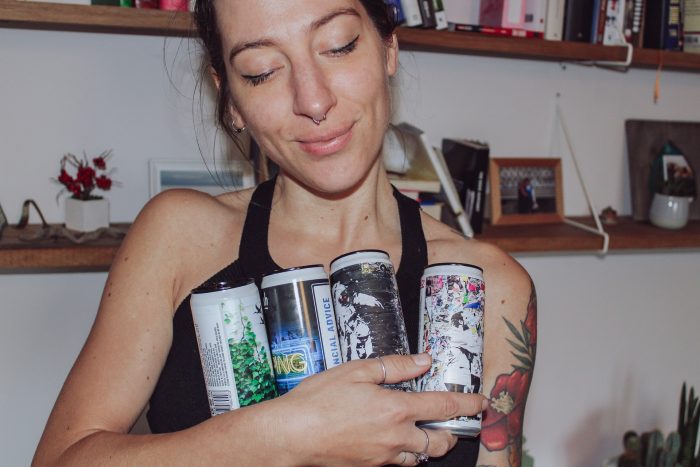Recently, many people have been reaching out to me sharing their personal struggles with alcohol.
I am no stranger to the havoc it can wreck on us physically, mentally, and emotionally.
Alcohol abuse is more prevalent than ever in today’s society yet despite how much we work toward removing the stigma, many people fear ridicule and judgment if they openly question their alcohol use or admit that they may have a problem.
What many don’t realize is that alcohol abuse does not necessarily equate to alcoholism or addiction, but it does mean that a person has a propensity toward self-destructive behavior.
There are a multitude of variables at play, thus abuse does not always equal addiction or dependency. We may have developed a habit that we enjoy on one level, but deeply despise on another, and it may have a negative—rather than positive—impact on our lives.
Before I dive deeper into this, please be reminded that not everyone is fortunate enough to stop drinking without intervention.
There are those who are alcoholics, who are physically dependent on this toxin and cannot stop without severe withdrawal symptoms.
These individuals may need professional help—to stop drinking, to minimize the physical withdrawals, and to reclaim their mental and emotional health without the bottle. This may require inpatient or outpatient treatment, counseling, and a strong support system. Please keep this in mind as you read on.
Having addictive or self-destructive tendencies is not a moral issue or a matter of sheer willpower. It is not a character flaw or weakness. We have no way of knowing which substance we may grow to depend upon or abuse until we take that first sip—sniff, bite, puff, and so on.
There are people who have a daily nightcap—nothing more, nothing less. Others may share a bottle of wine over dinner or stop into the local pub for a pint before heading home for the evening.
Yet there is a recurring theme here—one drink. You know, the people who can take a sip or two and not care if they finish the glass. The ones who leave a couple of inches of wine in the bottle. The ones who know when to stop, when to go home, and do not anticipate their next one, two, or three drinks.
Then there are people who unwittingly find themselves in the throes of problem drinking. The one glass turns to two, then three, then there’s not enough. The weekend drinking finds its way into the weekdays. The glass of wine becomes a need, like an itch that will not go away, rather than an optional beverage. This happens slowly, unconsciously, and insidiously.
That is when drinking becomes an issue in our lives.
We put restrictions on our drinking, promising ourselves that we will only have one glass, and then find ourselves at the bottom of the bottle—once again.
We commit to drinking socially, until we admit to ourselves that we are more social than we ever planned to be when sober.
We look for ways to drink, people to drink with, and plan our lives around alcohol. Alcohol consumes our thoughts, therefore our lives—even when we are not drinking.
Drinking is no longer a friend, but a foe. Drinking is no longer fun, but a job. Drinking has taken over our lives.
Has alcohol taken center stage in your life? Are you questioning your habits and wondering if you have a problem?
Whether you are a problem drinker, abuse alcohol, or are alcohol dependent, the answers to those questions can be the first step to reclaiming your life.
In doing so, you will then discover what level drinker you are and what additional steps you need to take to break free, or drastically reduce, your alcohol usage.
By using these affirmations, you will start to see what you can add to your life rather than what you will be removing. The benefits are many if the goal is to improve your health, enhance your mental clarity, and optimize your well-being.
Don’t think about what you will miss—think about all that you will gain.
Six things to think about before you take your next sip:
If I don’t drink, I may feel less tired.
Feeling tired is a way of life for many of us, despite our best efforts to get ample rest, but there is a difference between day-to-day tiredness and the fatigue resulting from a hangover.
Let this sink in. It takes about an hour for the effects of a small shot of liquor to wear off, two hours for a pint of beer, three hours for a large glass of wine, and several hours for a few drinks. Multiply that by how much you really drink—not how much you say you drink—then tally it up day after day. Exhausting!
Think about this before you take that next sip.
If I don’t drink, I may feel more energetic.
Reducing or eliminating your alcohol intake will most definitely give you more energy. You won’t feel it immediately because your body needs to rid itself of the toxins. Alcohol is a poisonous substance when consumed in high quantities.
Your body will need time to restore and repair along with plenty of rest, exercise, and water to rehydrate.
Think about this before you take that next sip.
If I don’t drink, I may wake up with a clear head each morning.
Many of us know what it is like to wake up with a big head after a night of overindulgence. We are foggy, shaky, and feel as if we are carrying pounds of lead around. Our eyes are puffy, our body is sore, and we are slightly dizzy. The nausea is debilitating and we just want to crawl back into bed or die.
It is not a good feeling.
Then comes our morning proclamation that we will never drink again—or at least not as much, and we may not drink that day.
Yet once our head clears and we feel good again, that’s when we want our next drink. We think a glass of wine or a cocktail would be nice and we vehemently state that we will not over-imbibe—until we do. Then we repeat the cycle over, and over, and over again. This is why we are tired and low in energy.
Think about this before you take that next sip.
If I don’t drink, I won’t have to worry about stopping at one.
No alcohol means no worrying or preoccupation with limits. If we don’t start, we won’t have to stop.
If you are someone who is struggling with this, switch to soda water with lime and a splash of cranberry. You will most likely find out that you don’t chug them back or continue on to multiple rounds. Maybe one or two, but not twelve.
If this proves to be true, alcohol might be problematic for you.
Think about that before you take your next sip.
If I don’t drink, I may not be filled with shame, regret, and self-loathing.
Your eyes open and it’s, OMG.
“What time did I go to bed? Who did I talk to? Did I text anyone? Was I in control or way out of it? Was I funny or sloppy? Was I mean, cranky, or weepy? What have I done?”
You struggle to recall the evening, but at some point, it became a blur. Better that you passed out than blacked out because if it’s the latter, you have no idea what became of you or anyone else.
Then you find yourself caught up in a cycle of shame, regret, and self-loathing. You make a promise to yourself that it will never happen again. You consult the AA questionnaire to see how many boxes you check this week. You read articles on problem drinking. You hate yourself.
When you don’t drink, you won’t have to worry about what you said or did.
Think about that before you take your next sip.
If I don’t drink, I may improve my relationships.
Alcohol can result in a nice, rosy glow or a slight feeling of pleasant intoxication, but when we cross that line, it can drastically change our personality. Things can get ugly.
Maybe you’re a nasty drunk or miserable human being because you’re constantly hungover, making you impatient, irritable, or short-tempered.
This has an impact our relationships—all of them. The spouse we snap at. The child we punish needlessly. The colleague we disregard. The grocery clerk who suffers our wrath.
Some people drink to relieve stress and anxiety only to find out that alcohol use may actually be causing it.
Think about this before you take your next step.
If are ready to seek help or support now, there are many options to reduce drinking or get sober today.
I invite you to visit This Naked Mind or Alcoholics Anonymous.
There is no one size fits all when it comes to drinking or sobriety. Find what works for you.
~












Read 4 comments and reply